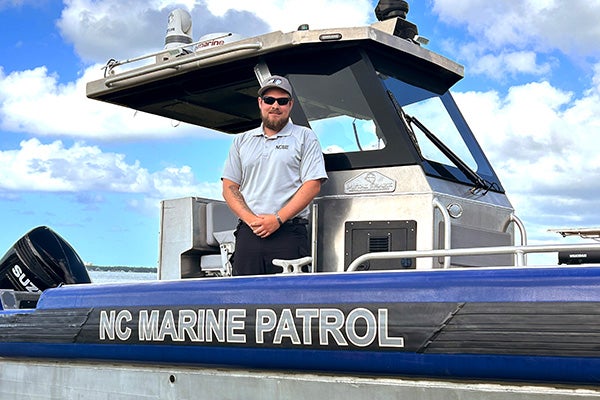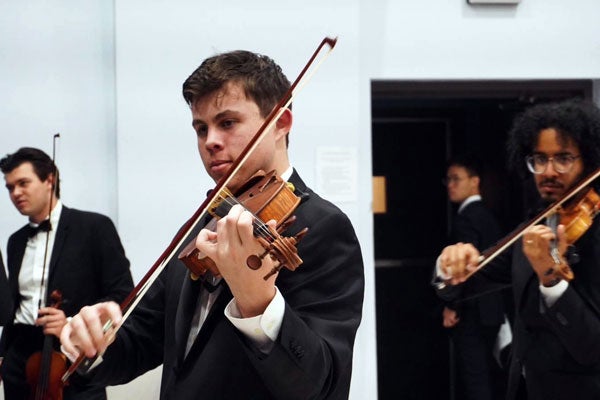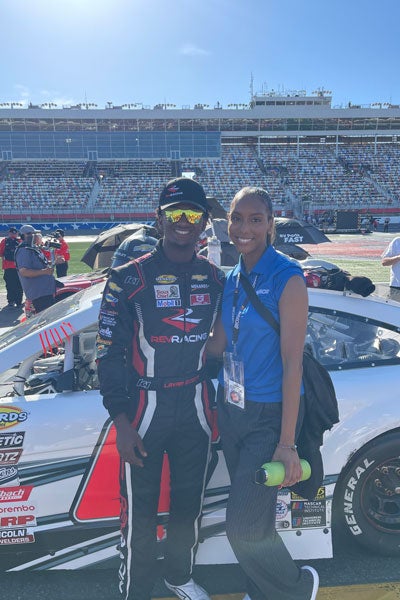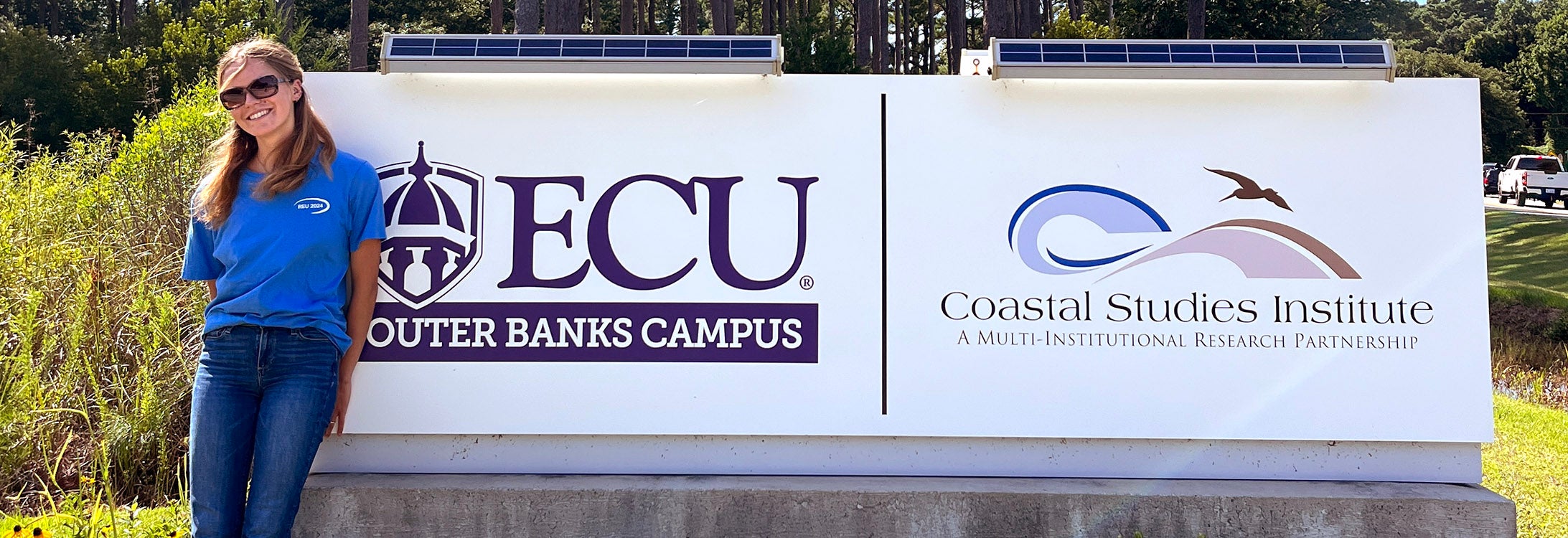Pirates make most of summer experiences
Many East Carolina University students spent their summers as interns, gaining real-world experience in their respective fields. These four Pirates played music, studied rainfall, wrote press releases and kept North Carolina’s coastal waters safe.
Rain is a Good Thing
Rising senior Paige Day spent part of her summer researching summer rainfall in the Carolinas and Gulf Stream as part of a Research Experience for Undergraduates (REU) for Coastal Change Across Communities at the Coastal Studies Institute.
ECU, Clemson and the University of Puerto Rico – Arecibo hosted the 10-week program. It brought Day and eight other students from institutions across the country to Wanchese where they matched with a mentor, conducted an independent research project and participated in a team research project.
Funded by a grant from the National Science Foundation, the program aims to address and solve problems that coastal areas face such as extreme weather, sea level rise and population growth.
Day worked with Dr. Rosana Ferreira, Integrated Coastal Sciences doctoral program director and ECU associate professor of applied atmospheric science, and Dr. Tom Rickenbach, professor of atmospheric science, to study the summer diurnal precipitation cycle on the North Carolina coast and in the Gulf Stream, a warm water Atlantic Ocean current.
“We investigated the local rain cycle that occurs when there is no large-scale weather event impacting precipitation,” said Day. “In the summer, the Gulf Stream and coast experience a phenomenon where there is offshore rain in the early morning and inland rain in the afternoon. Using radar imagery and precipitation data, we can model and observe this phenomenon and study it in other regions.”
The applied atmospheric science major from Media, Pennsylvania, learned about the internship in one of her classes.
“I heard about this opportunity from Dr. Hong-Bing Su, who encouraged the Meteorological Instruments and Observations class to apply to the program,” Day said. “I love the coastal emphasis of the program and the focus on sustainability from a multidisciplinary perspective.”
A familial connection to hurricanes sparked Day’s interest in coastal weather.
“Having family who experienced Hurricane Katrina, I’ve always been interested in forecasting, preparing and responding to coastal storms,” said Day.
As part of her research, Day hopes to gain a greater knowledge of potential energy from the Gulf Stream and local atmospheric conditions.
“I hope that improving the understanding of the Gulf Stream, sea breeze circulations and atmospheric precipitation trends will help optimize energy acquisition; additionally, continuing to investigate how the local atmosphere works without a large weather system impacting precipitation, and how this might change with a changing climate,” said Day.
Because of the interdisciplinary approach offered by the REU, several majors were represented among the students including atmospheric science, chemistry, sociology, biology, geology, mathematics, earth and oceanographic science, and environmental science. As a result, Day’s knowledge of weather proved to be quite useful to her peers.
“Coastal management is an interdisciplinary science, and it has been so rewarding to learn about everyone’s projects, interests and experiences,” she said. “I helped the other students by becoming the resident weather woman. It has been funny having my peers come to me to ask about the weather this weekend at the beach, as well as why we are experiencing certain precipitation, heat and wind trends.”
Day’s experience in the REU program allowed her to gain knowledge in her field of study, practical application and a bit of self-discovery.
“As an atmospheric science major, daily analysis of weather maps, radar images and other forecasting outputs has improved my understanding of meteorology and forecasting,” said Day. “Connecting this experience with the theoretical concepts and atmospheric dynamics I have learned in class, as well as studying local meteorology, have increased my confidence in my abilities.”
On Patrol
Austin Glenn spent his summer on the water — literally.
Glenn interned with the North Carolina Division of Marine Fisheries in Washington, North Carolina, and worked specifically with the Marine Patrol. Richard Allsbrook, a teaching instructor in the ECU Department of Criminal Justice and Criminology, directed the Farmville native and criminal justice major to the internship.

Austin Glenn was an intern for the North Carolina Division of Marine Fisheries where he worked with the Marine Patrol. (Contributed photo)
“I had told him (Allsbrook) that I would like to be a wildlife officer after I graduate, and he suggested the Marine Patrol,” Glenn said. “From the first day, I have enjoyed every minute of it and have learned a lot of information from the species they deal with to the different laws that recreational and commercial fishermen must follow.”
Marine Patrol officers check commercial and recreational fishermen, patrol waterways, and inspect seafood houses, vehicles transporting seafood and restaurants for rule compliance, among other duties. They also collaborate with other state agencies for enforcement, which Glenn witnessed firsthand.
“I participated in a joint operation — Operation Dry Water — between wildlife officers, Marine Patrol officers, the N.C. Highway Patrol and Alcohol Law Enforcement officers,” Glenn said. “We were looking for boat operators who were impaired and any underage passengers who may have been drinking.”
The summer spent with the Marine Patrol has been eye-opening for Glenn, and one that has allowed for much growth.
“This internship has helped me grow personally by showing me the side of law enforcement that not many people see, and the knowledge they must retain and the different interactions they have on a daily basis,” he said.
A Lone Star Symphony
ECU sophomore Ford Anderson is part of the Honors College and spent part of his summer playing with classical musicians at the Immanuel and Helen Olshan Texas Music Festival hosted by the University of Houston.

Ford Amerson was one of 10 viola players selected to attend the Texas Music Festival. (Contributed photo)
The Texas Music Festival brings college and graduate-age orchestral musicians together through a three-week intensive summer training program. Amerson was one of 80 fellows selected for the program and one of just 10 viola players chosen.
“I saw the festival advertised throughout the School of Music,” said Amerson. “I sent in audition videos and was chosen to be a fellow.”
Amerson, a Greenville native, performed multiple orchestra pieces including Stravinsky’s Firebird Suite, Strauss’ Ein Heldenleben, Symphony No. 9 by Bruckner and Daphnis et Chloe Suite No. 2 by Ravel. His performance in a competition earned an additional opportunity to showcase his skills.
“I was fortunate enough to win the chamber music competition, allowing me to perform the Brahms G major Sextet No. 2 with the faculty,” said Amerson. “I was chosen over two doctoral viola students and learned, rehearsed and performed this piece in under two weeks.”
Fellows lived together in a University of Houston residence hall and ate daily in one of the school’s cafeterias. They also received a tuition stipend for the three-week tenure. The relationships built during the festival will last much longer than the three-week session.
“One of the best parts about the trip was all of the friends I made throughout the three weeks,” said Amerson. “I met so many wonderful musicians that inspired me to grow and play at a high level. Many of us came by ourselves without knowing anyone, which created instant bonds that remained throughout the festival and now beyond.”
Amerson’s fellowship allowed him to grow as a musician and a person, he said. He is earning degrees in music with a concentration in performance (viola) and economics.
“I made great connections and worked with numerous professionals in Texas, which forced me to push myself to a higher level. Being surrounded by an intense musical culture allowed me to grow musically and professionally,” he said.
Speedy Summer
Nylah Alexander spent her summer in the fast lane, interning with the NASCAR Diversity Internship Program (NDIP) and Rev Racing. Alexander is a communication major with a concentration in journalism and public relations.

Nylah Alexander, a NASCAR Diversity Internship Program intern, stands with Rev Racing driver Lavar Scott prior to a race at Charlotte Motor Speedway. (Contributed photo)
“I heard about this opportunity around November/December when I was applying to summer internships on LinkedIn,” she said. “I was mass applying to anything sports-related that was located in Charlotte where I’m from.”
Prior to her internship, Alexander had never attended a race.
“Before this internship, I knew absolutely nothing about NASCAR except that it was very loud,” said Alexander. “It’s funny because coming into it the drivers were so surprised I didn’t know who Dale Earnhardt was or a lot of the rules. My peers in my internship class also did not know much about NASCAR, but everyone that I met has been very nice and they want more people to know what NASCAR is about and how fun it is to attend a race.”
Alexander worked with Rev Racing as part of the internship. The organization fields teams in the ARCA developmental series and in weekly racing series across the country.
“Rev Racing is a team partnered with NASCAR to bring more drivers from diverse backgrounds that want to get into the sport,” said Alexander. “The drivers here range from the age of 12 to 22 and after the age of 22 they ‘age out.’ They learn everything from race craft on the track to personal branding off the track. It’s like a university but for racing.”
Alexander’s duties included writing weekly press releases, taking pictures for social media accounts, helping drivers build their personal brand, attending media events with the drivers and scheduling interviews before and after events. She also traveled to ARCA series races with the team’s drivers, serving as their public relations representative. Her work experience was a strong supplement to what she learned in the classroom.
“A lot of the work we do I relate it to what I learned, and I love how I’m getting hands-on experience. I think this will help me after graduation because of the experience I’m getting, the networking and connections — we get a mentor for the summer from someone who was also in NDIP which is great — and I’m also getting some marketing experience under my belt.”
